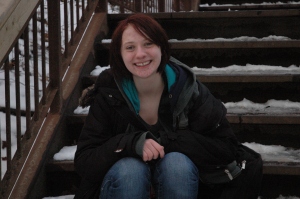Breaking Down Big Goals
This year I think most of us have big goals and high hopes. Like me, you might be planning to finish rewriting and to submit your first novella. Or you might be planning to write two first drafts and edit the first book. Or you might be planning to write a lot of short stories and send those out. You might even have books with publication dates that you’re just itching to sell.
On a personal front, you might be planning to quit smoking, eat healthier, learn more. You might have decided that this year you want to work on more non-writing creative projects. You might want to spend this year focusing on finishing high school and getting into university. Whatever your goals are, it’s time to take a look at how to accomplish them.
Breaking Down Your Goal: The Basics
Each of your big goals can and should be broken down into more manageable goals. A yearly goal can usually easily be broken down into monthly goals. If your big goal is nebulous-eat healthier or write more, for example-that’s fine, as long as you can break it down into concrete monthly goals. For example, in January you might start eating healthier by making sure you eat a bowl of salad every other day. You might start writing more by writing one page every day. In February you might want to eat fresh fruit every day, alternating between apples, oranges, and several kinds of berries. You might also want to write two pages every day.
The biggest goal for me this year is to finish a complete rewrite of my 2006 Nanowrimo, Moonshadow’s Guardian, and to be ready and able to submit it by my eighteenth birthday on August 29th. I have decided to split it into two novellas for story reasons. I only want to submit the first one on my eighteenth birthday, but I would like to have finished the second one by the end of the year.
So how do I break up this goal? It looks something like this:
January-February: During January and February I will finish the first Novella, which will remain named Moonshadow’s Guardian. This will consist of writing a page or two every day, and tinkering briefly with the page before the one I’m working on to get me back into story mode. When breaking up your own goal, remember that things don’t need to be done all at once. You have all year; spend January laying down a foundation for the rest of your work and February starting it.
March-April In March I will hopefully have already finished this draft of Moonshadow’s Guardian. This will make time to plunge fully into the writing of my current full-length novel project, Some Secrets Should Never Be Known. I’ll spend March working on other projects and start a second, smaller rewrite on April first. March is often used as an editing month and it is NanoEdmo, so I will probably be running several articles on editing during that month.
When breaking up your goal, remember that by April 30th you should be about a quarter of the way to reaching your goal.
May-June I will finish the second, smaller rewrite preferrably by May 15th. It will take less time than the first because there will be less to do-probably a lot less. In June I will be able to start my first edit of Some Secrets Should Never Be Known, but I will also be preparing a synopsis, query, and a market list. The market for Novellas is growing, so while I already have my eyes on a very specific publisher, I will also be looking into other publishers around this time.
By June you should have made decent progress into your goals, enough that you are just riding on momentum. If you haven’t, don’t worry, it just means you need to spend more time on your goals. Think carefully about where you can find extra time. And if you have a problem with writer’s block, try some meditation and some prompts. Think about why you’re blocked and how you can get past it.
July-August July will probably be my most writing-heavy month, because in August I will probably be fleeing Toronto to visit a friend of mine in BC. Since I’ll be driving across the country with my boyfriend, I won’t have too much time to write. I probably won’t even have a laptop by then. So in July I want to do one final minor edit on Moonshadow’s Guardian, write a final copy of the synopsis and a final copy of the first query I would like to send out. (To a specific publisher.) In August I will probably just be sending it out.
By July you should be halfway through your goal. July’s a good month to finish one stage of your project entirely and to begin a new one. Those of us who have vacation during the summer should take account of that and make the best use of our time possible.
September-October By September Moonshadow’s Guardian, the first novella, will be out on submission. While I sit and wait anxiously for a response, in September and October I will be outlining and naming the second novella as well as planning for Nanowrimo.
September is a time for new beginnings; if you can have one goal finished by September and start another related goal by October, you’re ahead of the game. Now you should be very close to achieving your goal, with only a couple of things left to do. It’s also a good time to start thinking about how you can build upon your achievements next year. And in October, don’t forget to prepare for Nanowrimo.
November-December In November everything I’m working on will go on hold for Nanowrimo. In December I’ll take the first week or so off, but I would like to start working on the second novella. I also want to write a couple of short stories in December.
If you participate in Nanowrimo, then you might want to put everything else on hold for the month. If you don’t then you have an extra month to work on reaching your goal. November is a good time to start a habit that’s generally indoors-writing daily, drawing daily, blogging daily-and you’ll find lots of challenges all over the web to help you with this.
Obviously by December you should have only little things to do for your goal. By this point I will have finished Moonshadow’s Guardian and sent it out, and finished two drafts of Some Secrets Should Never Be Known, as well as having completed two workshops here on the blog and several short stories. December should be a slow month when it comes to your goals because Christmas will eat all your time.
How you can use this to your advantage
You don’t have to break your goal down into smaller monthly goals entirely just yet, but it’s good to have your January and February goals decided now at the very least, with an idea of what comes next. Remember to take monthly times into account when you’re setting goals-if you are going on a non-writing vacation (or minimal writing vacation) or if one month you know you’ll be working extra hours, set a smaller goal for that month; if you have a big vacation in the summer with lots of spare time, then prepare to devote yourself to your goals.
Each month’s goal should build upon the last. If one month you finish a first draft, the next month you should do something else, but keep the rewrite in the back of your mind and maybe send out part of it for critique. If you start eating salad three times a week one month, you should start an exercise routine or start eating more fresh fruit. Maybe one month you’ll stop biting your nails and the next you’ll stop smoking.
If your goals are nebulous, then you break them down into concrete monthly goals. If you achieve each concrete monthly goal, then you will have achieved your yearly goal. For example, I have an unofficial goal to take better care of myself. This will manifest in first cutting back on gluten (I might have Celiac, which means I shouldn’t eat gluten) and stopping biting my lips. Then I will be endeavoring to wash my face and brush my teeth more often, because I don’t do those things as much as I should. Finally I will be quitting smoking. One thing leads to another. One goal, one success, helps you believe that you can succeed at the harder task.
If you get discouraged, remember why you made the goal. Remember that you are rewriting to submit; you are eating better to live longer; you are submitting to become a published author; you are blogging to meet new friends.
Next week I’ll probably be posting about changing your mindset to change your life.
Posted on January 14, 2011, in Editing: The Hard Part, Novels, Preparing to Submit, Workshops, Writing, Writing: The Process and tagged breaking up goals, reaching goals, Writing, writing goals. Bookmark the permalink. 2 Comments.




Greetings:
Great post. Big, scary goals are often hard to achieve because they are … well … big and scary. Breaking down the tasks as you suggest is a perfect way to achieve goals. : )
I’m a great fan (and collector) of The Great Phrase. One of my favourite expressions is “If you make decisions today just to stay alive, that is all you will do”. I like it because it gets at the heart of Making Changes is choice. It is an active thing – a decision and action – to do something different. Being aware of choices when one is making them and understanding consequences is a step to help do something different. One “little” thing at a time – if done regularly over a long time – has a massive effect.
Looking forward to the next post as ever … : )
Cheers!
RP
(PS: any prompt for this week? did I miss it? or tell me to chill my beans … lol)
RP,
That’s a great quote. It really relates to something I’ve been trying to explain to a very dear friend of mine-if you want to get better, if you want to get to the other side of your depression, you have to focus on getting better rather than just getting through the day.
Little steps are like the building blocks of your future; one page every day gives you a novel in a year-and is one page a day really so hard?
Thanks for reading,
~Dianna
(PS: No prompt this week ’cause Monday’s post was opening the new blog. Prompt tomorrow though 🙂